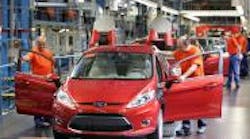“Previous fuel economy standards have left huge consumer savings on the table. A 60 mile per gallon standard in 2025 will capture those enormous benefits and provide important protections for American consumers.” –Mark Cooper, director of research, Consumer Federation of America (CFA)
Here’s a crazy idea: establishing a 60 mile-per-gallon (mpg) car and light truck fuel economy standard just 15 years from now. That’s the recommendation of the Consumer Federation of America (CFA) in a new report that weighs the cost savings of super-fuel efficiency against the expense of the technology required to achieve it.
According to the CFA’s math, a 60 mpg vehicle would save the typical car buyer in excess of $1,000 in fuel costs over and above the increased vehicle cost by the time the average automotive loan is paid off (typically five years) and some $3,000 over the life of the vehicle, estimated at roughly ten years, which the consumer could capture in the sale price of the vehicle or by holding on to it.
CFA noted that its report combines estimates of technology cost from the National Academy of Sciences and the Massachusetts Institute of Technology (MIT) with the costs benefit analysis previously prepared by the Environmental Protection Agency (EPA) and the National Highway Traffic Safety Administration (NHTSA) to derive its estimates of what is technologically feasible and economically justified.
The Energy Information Administration's projected price of gasoline for 2025 of $3.50 per gallon of gasoline (in 2010 dollars) is used in the CFA’s analysis, along with the assumption of a 7% interest rate for a five-year auto loan, which the group said the average auto loan rate for the past 20 years.
One reason the CFA is calling for a 60 mpg standard is that the group believes the established 34 mpg standard for light vehicles – due to go into effect by 2016 – falls far short than what would be in the best interest of consumers and society.
Its economic analysis shows that even going to 38 mpg would have delivered additional benefits of $140 billion over the life of the vehicles covered. Thus, moving to a 60 mpg standard would add hundreds of billions more in terms of consumer savings, while further cutting greenhouse gas (GHG) emissions by hundreds of millions of tons, the group said.
Is this doable? The CFA believes so – and thinks that setting such high targets will ensure some gains are made at the very least.
“One of the reasons that the administration must set targets so far in advance is that the automotive industry has been slow to adjust to the clear consumer demand for greater fuel economy,” noted Mark Cooper, CFA’s director of research (at right).
“We must set our sights on a higher mid-term goal like 60 mpg by 2025 to get the industry moving in the right direction,” he stressed. “A real victory can only be claimed when the standards are set at a level that captures the immense benefits that had been left on the table.”
The REAL question, though, is whether the technology to achieve 60 mpg for cars and light trucks is within economic reach. Fifteen years is an awful short time window to achieve a goal like this. Is it possible? That’s the tricky question yet to be answered.






